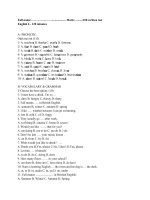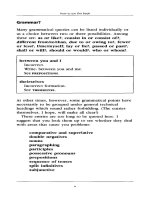lỗi sai trong tiếng anh 6 doc
Bạn đang xem bản rút gọn của tài liệu. Xem và tải ngay bản đầy đủ của tài liệu tại đây (187.07 KB, 6 trang )
AMBIGUITY
(a)
My
brother congratulated
his
friend
on
winning
first
prize
in the
local photographic
exhibition.
(b)
My
brother,
delighted
to
have
won first
prize
in
the
local photographic exhibition, told
his
friend.
The
other possibility
is
rather clumsy
but is
otherwise clear:
(c)
My
brother told
his
friend
that
he
(his friend)
had
won first
prize.
(d)
My
brother told
his
friend that
he (my
brother)
had won first
prize.
(ii)
Position
the
adverb
ONLY
with great care.
It
will
refer
to the
word nearest
to it,
usually
the
word following. This
may not be the
meaning
you
intended.
See how
crucial
to the
meaning
the
position
of
'only'
can be:
ONLY
Sean eats
fish on
Fridays.
(=
No one
else
but
Sean eats
fish on
Fridays.)
Sean
ONLY
eats
fish on
Fridays.
(=
Sean does nothing else
to the fish on
Fridays
but
eat it. He
doesn't
buy it,
cook
it,
look
at it,
smell
it )
Sean
eats
ONLY
fish on
Fridays.
(=
Sean eats nothing
but fish on
Fridays.)
Sean
eats
fish
ONLY
on
Fridays.
Sean
eats
fish on
Fridays
ONLY.
(=
Sean eats
fish on
this
one day in the
week
and
never
on any
other.)
(iii)
Take care with
the
positioning
of
BADLY.
This
room needs cleaning
BADLY.
Does
it? Or
does
it not
need cleaning well?
Rewrite
like this:
14
AMBIGUITY
This
room
BADLY
needs cleaning.
(iv)
Beware
of
causing initial bewilderment
by not
introducing
a
comma
to
indicate
a
pause.
The
shabby little riverside
cafe
was
empty
and
full
of
wasps
and flies.
Empty
and
full?
The
shabby little riverside
cafe
was
empty,
and
full
of
wasps
and flies.
See
COMMAS
(ix).
(v)
Avoid
the
danger
of
writing
nonsense!
DRIVING
slowly along
the
road,
THE
CASTLE
dominated
the
landscape.
The
castle
is
driving?
Rewrite:
As
we
drove slowly along
the
road,
we saw how
the
castle dominated
the
landscape.
COOKED
slowly,
the
FAMILY
will
enjoy
the
cheaper cuts
of
meat.
Rewrite:
If
the
cheaper cuts
of
meat
are
cooked slowly,
the
family
will enjoy them.
See
PARTICIPLES.
(vi)
Make
sure
the
descriptive details describe
the
right noun!
For
sale:
1995
Peugeot
205 - one
owner with
power-assisted steering.
Rewrite:
For
sale: 1995 Peugeot
205
with power-assisted
steering
- one
owner.
15
AMEND
OR
EMEND?
amend
or
emend?
Both
words
mean
'to
make changes
in
order
to
improve'.
Use
AMEND
or
EMEND
when referring
to
the
correction
of
written
or
printed text.
Use
AMEND
in a
wider
context
such
as
AMENDING
the law or
AMENDING
behaviour.
ammount
Wrong spelling.
See
AMOUNT.
among
(not
amoung)
among/amongst
Either
form
can be
used.
among
or
between?
Use
BETWEEN
when something
is
shared
by two
people.
Use
AMONG
when
it is
shared
by
three
or
more.
Share
the
sweets
BETWEEN
the two of
you.
Share
the
sweets
AMONG
yourselves.
However,
BETWEEN
is
used with numbers larger
than
two
when
it
means
an
exact geographical
location
or
when
it
refers
to
relationships.
Sardinia
lies
BETWEEN
Spain, Algeria, Corsica
and
Italy.
It
will take
a
long time before
the
rift
BETWEEN
the five
main parties heals.
amoral
or
immoral?
There
is a
difference
in
meaning.
AMORAL
means
not
being governed
by
moral laws,
acting
outside
them,
(note
-m-)
IMMORAL
means breaking
the
moral
laws,
(note
-mm-)
16
-ANCE,-ANT/-ENCE,-ENT
amoung
Wrong
spelling.
See
AMONG.
amount
(not
ammount)
amount
or
number?
AMOUNT
is
used with non-count nouns:
a
small
AMOUNT
of
sugar;
a
surprising
AMOUNT
of
gossip.
NUMBER
is
used with plural nouns:
a
NUMBER
of
mistakes;
a
NUMBER
of
reasons.
analyse
(not
-yze
as in
American English)
analysis
(singular) analyses (plural)
See
FOREIGN
PLURALS.
-ance,-ant/-ence,-ent
Words with these endings
are
difficult
to
spell
and
you'll
always
need
to be on
your guard
with
them.
Check
each
word
individually when
in
doubt,
but
here
are
some
useful
guidelines:
(i)
People
are
generally -ant: attendant, lieutenant,
occupant, sergeant, tenant (but there
are
exceptions like superintendent, president,
resident ).
(ii)
Use
-ance, -ant, where
the
companion word
ends
in
-ation: dominance, dominant,
domination; variance, variant, variation.
(iii)
Use
-ence, -ent
after
qu:
consequence,
consequent;
eloquence,
eloquent.
(iv)
Use
-ance, -ant
after
hard
c or
hard
g:
significance,
significant
(c
sounds like
k);
elegance, elegant
(hard
g).
17
(v)
Use
-ence,
-ent
after soft
c or
soft
g:
innocence,
innocent
(c
sounds like
s);
intelligent, intelligence
(g
sounds like
j).
See
SOFT
c
AND
SOFT
G.
and/but
Many
of us
have been taught never
to
begin
a
sentence
with
AND or
BUT. Generally speaking this
is
good advice. Both words
are
conjunctions
and
will
therefore
be
busy
joining words within
the
sentence:
I
should love
to
come
AND I
look forward
to the
party
very
much.
They
wanted
to
come
BUT
sadly they
had to
visit
a
friend
in
hospital some miles away.
However,
there
are
some occasions when
you may
need
the
extra emphasis that starting
a new
sentence
with
AND or BUT
would give.
If you
have
a
good
reason
to
break
the
rules,
do so!
anecdote
or
antidote?
An
ANECDOTE
is a
short, amusing account
of
something that
has
happened.
An
ANTIDOTE
is a
medicine taken
to
counteract
a
poison.
angsiety
Wrong
spelling.
See
ANXIETY.
angsious
Wrong spelling.
See
ANXIOUS.
annex
or
annexe?
To
ANNEX
is to
take possession
of a
country
or
part
of
a
country.
An
ANNEX
is
another word
for an
appendix
in an
official
document.
An
ANNEXE
is a
building added
to the
main
building.
18
AND/BUT
ANTENNA
annoint
Wrong spelling.
See
ANOINT.
announce
announced, announcing, announcer, announcement
(not
-n-)
annoy
annoyed,
annoying,
annoyance
(not
anoy
or
annoied)
annul
annulled, annulling, annulment
See
ADDING ENDINGS
(iv).
anoint
(not
-nn-)
anounce
Wrong spelling.
See
ANNOUNCE.
anoy
Wrong spelling.
See
ANNOY.
ante-/anti-
ANTE-
means
before,
antenatal
=
before birth
ANTI-
means
against,
antifreeze
=
against
freezing
antecedent
This
means earlier
in
time
or an
ancestor,
(not
anti-)
See
ANTE-/ANTI
antediluvian
This
means very old-fashioned
and
primitive, literally
'before
the flood of
Noah',
(not
anti-)
See
ANTE-/ANTI
antenna
This
word
has two
plurals, each used
in a
different
sense:
Use
ANTENNAE
to
refer
to
insects.
19









